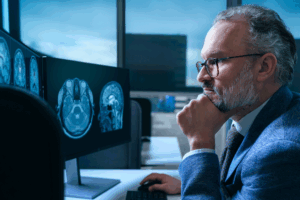Doctors first assess whether the individual has an underlying treatable condition such as
- Depression
- Abnormal thyroid function
- Drug-induced encephalopathy
- Normal pressure hydrocephalus
- Vitamin B12deficiency.
Early diagnosis is important, as some causes for symptoms can be treated. In many cases, the specific type of dementia that a person has may not be confirmed until after the person has died and the brain is examined.
An assessment generally includes:
- Patient history. Typical questions about a person’s medical and family history might include asking about whether dementia runs in the family, how and when symptoms began, and if the person is taking certain medications that might cause or exacerbate symptoms.
- Physical exam. Measuring blood pressure and other vital signs may help physicians detect conditions that might cause or occur with dementia. Such conditions may be treatable.
- Neurological evaluations. Assessing balance, sensory function, reflexes, vision, eye movements, and other functions helps identify signs of conditions that may affect the diagnosis or are treatable with drugs. Doctors also might use an electroencephalogram, a test that records patterns of electrical activity in the brain, to check for abnormal electrical brain activity.
The following procedures also may be used when diagnosing dementia:
- Brain scans. These tests can identify strokes, tumors, and other problems that can cause dementia. Scans also identify changes in the brain’s structure and function. The most common scans are computed tomographic (CT) scans and magnetic resonance imaging (MRI). CT scans use X-rays to produce images of the brain and other organs. MRI scans use a computer, magnetic fields, and radio waves to produce detailed images of body structures, including tissues, organs, bones, and nerves.A special Alzheimer’s scan is called an F18 scan. It’s strength is that it helps doctors “see” the amyloid plaque that is connected to Alzheimer’s. If a person has dementia but no plaque, it means they do not have Alzheimer’s but rather a different type of dementia. Even if they have Alzheimer’s, knowing the amount of plaque in the brain can help doctors provide better treatment. Roughly $2,700, the scan is new and expensive, but growing in popularity.Other types of scans let doctors watch the brain as it functions. Two of these tests are single photon-emission computed tomography, which can be used to measure blood flow to the brain, and positron emission tomography (PET), which uses radioactive isotopes to provide pictures of brain activity. These scans are used to look for patterns of altered brain activity that are common in dementia. Researchers also use PET imaging with compounds that bind to beta-amyloid to detect levels of the protein, a hallmark of AD, in the living brain.
- Cognitive and neuropsychological tests. These tests measure memory, language skills, math skills, and other abilities related to mental functioning. For example, people with AD often show impairment in problem-solving, memory, and the ability to perform once-automatic tasks.
- Laboratory tests. Many tests help rule out other conditions. They include measuring levels of sodium and other electrolytes in the blood, a complete blood count, a blood sugar test, urine analysis, a check of vitamin B12 levels, cerebrospinal fluid analysis, drug and alcohol tests, and an analysis of thyroid function.
- Presymptomatic tests. Some dementias are associated with a known gene defect. In these cases, a genetic test could help people know if they are at risk for dementia. People should talk with family members, their primary healthcare professional, and a genetic counselor before getting tested.
- Psychiatric evaluation. This will help determine if depression or another mental health condition is causing or contributing to a person’s symptoms.
SOURCE:
NIH National Institute on Aging
NIH National Institute on Aging











